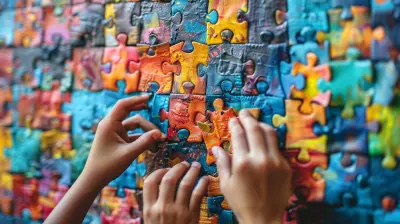Resilience in the Digital Age: Managing Online Stressors
8 July 2025
Let’s be real — being online all the time isn’t as fun as it used to be. Once upon a time, the internet was just cat videos and FarmVille. Now? It’s work emails at midnight, comparison traps on social media, and endless doomscrolling. And somehow, we're expected to stay sane through it all?
In this fast-paced digital jungle, resilience isn’t just a virtue — it’s a necessity. If you’ve ever found yourself drained after scrolling Instagram, stressed from constant notifications, or overwhelmed by the never-ending news cycle, this one's for you. Let's talk about building real, lasting resilience in the digital world we're all navigating.
What Is Resilience, Anyway?
Resilience is like your emotional immune system. It's not about pretending everything's okay or ignoring problems. Instead, it's how well you bounce back after life's curveballs — whether they come from a breakup, a job loss, or, yep, a poorly timed comment on your latest TikTok.In the digital age, resilience takes on a whole new dimension. We're not just dealing with face-to-face stress anymore — we're also battling digital overload, online criticism, and the toxic bliss of 24/7 connectivity.
The question isn't just, “Are you resilient?” — it's “Are you digitally resilient?”
The Hidden Stress of Being Online All the Time
We live more online than ever before. Our work, our friendships, even our downtime — it’s all tied to screens. That constant connectivity brings its own breed of stress.1. The Notification Monster
Ding. Buzz. Ping.Every notification pulls your attention, demanding you react instantly. It's like whack-a-mole, but instead of moles, it's emails, texts, app alerts, and Slack messages competing for your sanity.
This constant alertness — known in psychology circles as “hypervigilance” — keeps your stress response activated and your nervous system on high alert, even when you're technically relaxing.
2. Social Media Comparison Traps
You know the drill. You’re having an okay day, then you open Instagram and see someone’s flawless beach vacation, perfect relationship snapshot, or six-figure business announcement. Suddenly, your day feels a lot less okay.It’s not your imagination. Studies show that social media can mess with your headspace and your self-esteem. Welcome to the comparison game — where the rules are rigged, and nobody really wins.
3. The Doomscroll Spiral
Ever found yourself deep into a 2-hour news binge at 1 AM, reading about everything wrong in the world?That’s doomscrolling. And it’s addictive.
Our brains crave information in times of stress, but the type of content we consume online — especially emotionally charged or negative stories — can keep us locked in a cycle of fear and anxiety.
So, How Do We Manage Online Stressors Without Unplugging Completely?
Let’s face it. Telling you to just “log off” is like telling someone to stop drinking water because they're bloated. We need the internet. But we also need to make peace with it.Here's how to build digital resilience without ghosting your Wi-Fi.
1. Curate Your Feeds Like Your Mental Health Depends On It (Because It Does)
Your digital diet matters just as much as your food diet. If your social media feed is filled with negativity, fake perfection, or triggering content — clean it up. Follow people who uplift you, educate you, or make you laugh. Mute the rest.Think of it like this: would you let just anyone scream in your ear all day? No? So don't let them live in your feed rent-free either.
2. Set Healthy Tech Boundaries (Yes, Even With Friends)
Not every message needs an instant reply. Not every Zoom invite needs a yes. Give yourself permission to delay, decline, or detox.Some easy boundaries that help:
- No screens the first or last hour of your day.
- Designate “no-tech” zones, like your bedroom or dinner table.
- Use apps like Freedom or Forest to block distractions.
Boundaries aren't walls — they're filters. They're how you protect your peace in a noisy world.
3. Build a Coping Toolbox You Actually Use
When online stress rears its ugly head, what’s your plan? If your only answer is "scroll even more," we need to talk.Here are a few healthy coping go-tos:
- Journaling (yes, with a pen, on paper — so vintage, so soothing)
- Going for a walk, especially somewhere with trees
- Five minutes of deep breathing (try box breathing: in for 4, hold 4, out 4, hold 4)
- Talking it out with a friend (in person, or at least voice-to-voice)
- Listening to music that matches your mood or lifts it
The key here? Don’t wait until you’re drowning. Practice using these tools daily so they’re there when you need them most.
4. Reframe Your Relationship With Social Media
Social media isn’t evil. The algorithm isn’t out to ruin your life (probably).But here’s the kicker — how you use it matters.
Try this:
- Post less for likes, and more for joy.
- Engage with people who respond thoughtfully.
- Take breaks — real ones — when it feels like too much.
- Remember that everyone’s highlight reel is not their full story.
Imagine every post is the trailer. You’re not seeing the bloopers, the rejections, or the food poisoning from that “perfect” vacation.
5. Recognize When You Need Help — and Ask for It
There’s strength in admitting, “This is too much.”If tech-related stress is affecting your sleep, your relationships, or your mental health in general — get support. Whether it’s a therapist, a coach, or a close friend, having someone in your corner makes all the difference.
There’s no badge for doing it alone. And in today’s digital world, a little help goes a long way.
6. Practice Digital Mindfulness
Yes, it’s a thing. And no, it doesn’t mean you have to become a tech-averse monk.Digital mindfulness is about being intentional with your online time. It’s asking:
- Why am I opening this app?
- How do I feel before and after using it?
- Is this serving me or stressing me?
Even taking five seconds to check in with yourself before you dive into the social media vortex can shift everything.
7. Prioritize Real-World Joy
Let’s not forget — life exists outside of screens. The more you invest in your offline life, the less power the digital world has over you.Reconnect with analog pleasures:
- Read actual books (bonus: fewer pop-ups).
- Go outside, barefoot if possible.
- Have un-photographed conversations.
- Pick up a hobby that doesn’t involve pixels.
When your real life feels full and meaningful, you’re less likely to seek validation or escape online.
Final Thoughts: Resilience Is a Muscle — Start Flexing It
Look, we’re not leaving the digital world anytime soon. But we don’t have to let it run the show.Building resilience in the digital age means you take control where you can, protect your energy, and make space for the things that really matter. It means recognizing when to engage, when to step back, and how to recover without losing yourself in the scroll.
It’s okay to feel overwhelmed sometimes. You’re human. The trick is learning how to bounce back — stronger, wiser, and maybe just a little less addicted to notifications.
So the next time the online world feels like too much? Pause. Breathe. Remember your tools. And remind yourself — you’ve got this.
all images in this post were generated using AI tools
Category:
ResilienceAuthor:

Paulina Sanders
Discussion
rate this article
1 comments
Otis Adkins
Great insights! Resilience is crucial in navigating digital challenges.
August 6, 2025 at 3:35 AM

Paulina Sanders
Thank you! I completely agree—resilience is key to overcoming the unique challenges we face in the digital landscape.


